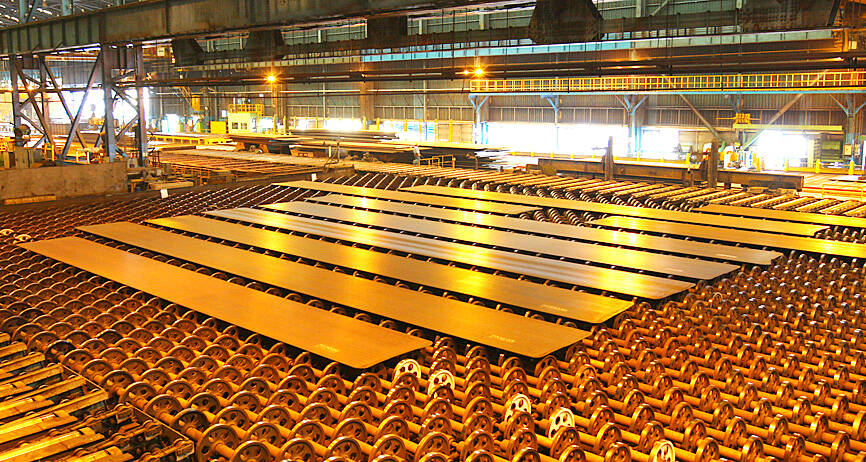China Steel Corp (CSC, 中鋼) yesterday announced that it would launch a share buyback program for the first time in 15 years to safeguard the interests of shareholders. The stock has dropped 18.62 percent this year.
In a statement posted on its Web site, the nation’s largest steelmaker said its board of directors has agreed to buy back up to 150 million shares, or 0.95 percent of total outstanding shares, at NT$16.98 to NT$37.26 per share.
The company is expected to spend NT$137.92 billion (US$4.27 billion) on the buyback plan and would distribute the repurchased shares to its employees, the statement said.

Photo: CNA
“In the past two or three years, the world has been affected by the COVID-19 pandemic, the Russia-Ukraine war and China’s strict pandemic controls, which have impacted global economic development, suppressed market momentum, caused equity fluctuations and affected steel demand,” the company said.
“The company’s stock price has been affected recently by the global political and economic situation and the weaker-than-
expected recovery of steel demand,” it said, adding that investors have overreacted to expectations of an economic downturn.
It is CSC’s first share repurchase plan since the 2008 global financial crisis, as the company aims to demonstrate its confidence in the steel market and its determination to safeguard the interests of shareholders, while motivating employees.
The buyback scheme, which is to start on Monday and run through Jan. 5 next year, would not be a financial burden for the Kaohsiung-based company, as the maximum amount needed to repurchase its shares would account for only 2.74 percent of the company’s current assets, China Steel said.
The stock closed 1.24 percent higher at NT$24.55 yesterday before the company unveiled its buyback plan and the latest financial data.
CSC posted losses per share of NT$0.05 in the third quarter, compared with earnings per share of NT$0.06 in the second quarter and NT$0.12 a year earlier, according to its filing with the Taiwan Stock Exchange yesterday.
In the first three quarters of the year, it posted losses per share of NT$0.03, versus earnings per share of NT$1.48 in the same period last year. Cumulative revenue over the period fell 22.38 percent to NT$274.93 billion from NT$354.19 billion a year earlier.
The board yesterday also approved a plan to invest NT$600 million to install neon production equipment, the company said, adding that neon is a key raw material for gas lasers in wafer processing and plays an important role in the semiconductor industry.
The company said the investment aims to bolster domestic supply of strategic semiconductor materials to enhance supply chain resiliency.
It is also part of the company’s efforts to diversify into other businesses for stable income in the long term, it said.

Semiconductor business between Taiwan and the US is a “win-win” model for both sides given the high level of complementarity, the government said yesterday responding to tariff threats from US President Donald Trump. Home to the world’s largest contract chipmaker, Taiwan Semiconductor Manufacturing Co (TSMC, 台積電), Taiwan is a key link in the global technology supply chain for companies such as Apple Inc and Nvidia Corp. Trump said on Monday he plans to impose tariffs on imported chips, pharmaceuticals and steel in an effort to get the producers to make them in the US. “Taiwan and the US semiconductor and other technology industries

SMALL AND EFFICIENT: The Chinese AI app’s initial success has spurred worries in the US that its tech giants’ massive AI spending needs re-evaluation, a market strategist said Chinese artificial intelligence (AI) start-up DeepSeek’s (深度求索) eponymous AI assistant rocketed to the top of Apple Inc’s iPhone download charts, stirring doubts in Silicon Valley about the strength of the US’ technological dominance. The app’s underlying AI model is widely seen as competitive with OpenAI and Meta Platforms Inc’s latest. Its claim that it cost much less to train and develop triggered share moves across Asia’s supply chain. Chinese tech firms linked to DeepSeek, such as Iflytek Co (科大訊飛), surged yesterday, while chipmaking tool makers like Advantest Corp slumped on the potential threat to demand for Nvidia Corp’s AI accelerators. US stock

The US Federal Reserve is expected to announce a pause in rate cuts on Wednesday, as policymakers look to continue tackling inflation under close and vocal scrutiny from US President Donald Trump. The Fed cut its key lending rate by a full percentage point in the final four months of last year and indicated it would move more cautiously going forward amid an uptick in inflation away from its long-term target of 2 percent. “I think they will do nothing, and I think they should do nothing,” Federal Reserve Bank of St Louis former president Jim Bullard said. “I think the

SUBSIDIES: The nominee for commerce secretary indicated the Trump administration wants to put its stamp on the plan, but not unravel it entirely US President Donald Trump’s pick to lead the agency in charge of a US$52 billion semiconductor subsidy program declined to give it unqualified support, raising questions about the disbursement of funds to companies like Intel Corp and Taiwan Semiconductor Manufacturing Co (台積電). “I can’t say that I can honor something I haven’t read,” Howard Lutnick, Trump’s nominee for commerce secretary, said of the binding CHIPS and Science Act awards in a confirmation hearing on Wednesday. “To the extent monies have been disbursed, I would commit to rigorously enforcing documents that have been signed by those companies to make sure we get